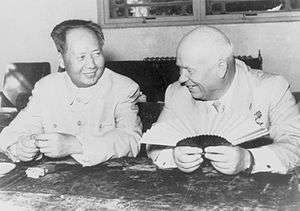Khrushchevism
Khrushchevism was a form of Marxism–Leninism which consisted of the theories and policies of Nikita Khrushchev and his administration in the Soviet Union.[1][2][3]

Mao Zedong recognized "Khrushchevism" as a distinct ideology and initially from a positive perspective, though later the term was used by the Chinese Communist Party as a term of derision against the politics of the Soviet Union.[4][5] Khrushchevism involves the rejection of Stalinism and particularly represents a movement away from Stalinist politics, including advocating a more liberal tolerance of some cultural dissent and deviance, a more welcoming international relations policy and attitude towards foreigners and a repudiation of Stalinist arbitrariness and terror tactics.[6] Khrushchevism was not only a phenomenon in the Soviet Union, as it was initially admired in China and Mao sought to model the Chinese Marxist–Leninist state upon principles developed by Khrushchevism; but disputes with the Soviet Union later ended friendly relations between Mao and Khrushchev.[7]
Origin
Khruschevism is the name given to a broad series the Soviet Union undertook during the leadership of Nikita Khrushchev. Khrushchev's goals were to reject the cult of personality around Stalin, liberalize the economy, and allow for greater political freedoms for the citizens of the Soviet Union.
Components
Rejection of Stalinism
Khrushchev denounced what he called Stalin's cult of personality. This involved tearing down the various statues that had been made in honor of Stalin, and allowing for arts and music that Stalin had banned.
Liberalizing the economy
Khrushchevism also rejects the strict adherence to the central planning that Stalin had used. Instead, Khrushchevism focuses less on heavy industry in the way that Stalin had, but more on consumer goods. This meant a reduction in the production of steel, and military products, and instead investment in things such as radios, televisions, medicine, and appliances.
Private Property
Khrushchevism allows for minor amounts of private property to be held, to spur economic growth and to give people better quality services should they be able to afford it. Khrushchev allowed the creation of privately owned apartment blocks, which is different from the communal housing that Stalin had enforced. This meant many people were having personal kitchens instead of communal ones for the first time.
Political Freedoms
Arts
Khrushchevism allows for the citizens to view artwork from outside the country, even if it is not supportive of the regime. Examples of this include Khrushchev letting books and movies from the west be shown in the Soviet Union, as he believed the quality of life portrayed in these works could be matched by the Soviet Union. Dudintsev's Not By Bread Alone was allowed to be published despite its criticisms of bureaucracy.
Travel
For the first time Khrushev allowed the people in the Soviet Union to travel in large groups outside of the Soviet Union. Critical of Stalin's travel restrictions, Khrushchev believed that the Soviet Citizens could see the quality of life in the west and that this would not be a problem as he would be able to match this quality of life in the Soviet Union. Over 700,000 Soviet citizens traveled abroad in 1957.
References
- Robert F. Miller, Ferenc Féhér. Khrushchev and the communist world. Kent, England, UK; Fyshwick, Australia: Croom Helm Ltd., 1984. Pp. 1-5. Describes the term "Khrushchevism"
- Milorad M. Drachkovitch. Marxism in the Modern World. Stanford, California, USA: Stanford University Press, 1965. Pp. 108. (Describes "Krushchevism")
- Jeremy Smith. Khrushchevism after Khrushchev: The rise of national interest in the Eastern Bloc by Katalin Miklossy, Khrushchev in the Kremlin: policy and government in the Soviet Union, 1953-1964. Oxon, England, UK; New York, New York, USA: Routledge, 2011. Pp. 150.
- Robert F. Miller, Ferenc Féhér. Khrushchev and the communist world. Kent, England, UK; Fyshwick, Australia: Croom Helm Ltd., 1984. Pp. 6-8.
- Franz Schurmann. Ideology and Organization in Communist China . 2nd edition. Berkeley and Los Angeles, California, USA: University of California Press; London, England, UK: Cambridge University Press, 1968. P. 33. Shows the later use by the Chinese Communists of "Khrushchevism" as a term of derision.
- Robert F. Miller, Ferenc Féhér. Khrushchev and the communist world. Kent, England, UK; Fyshwick, Australia: Croom Helm Ltd., 1984. Pp. 5.
- Robert F. Miller, Ferenc Féhér. Khrushchev and the communist world. Kent, England, UK; Fyshwick, Australia: Croom Helm Ltd., 1984. Pp. 6-8.
